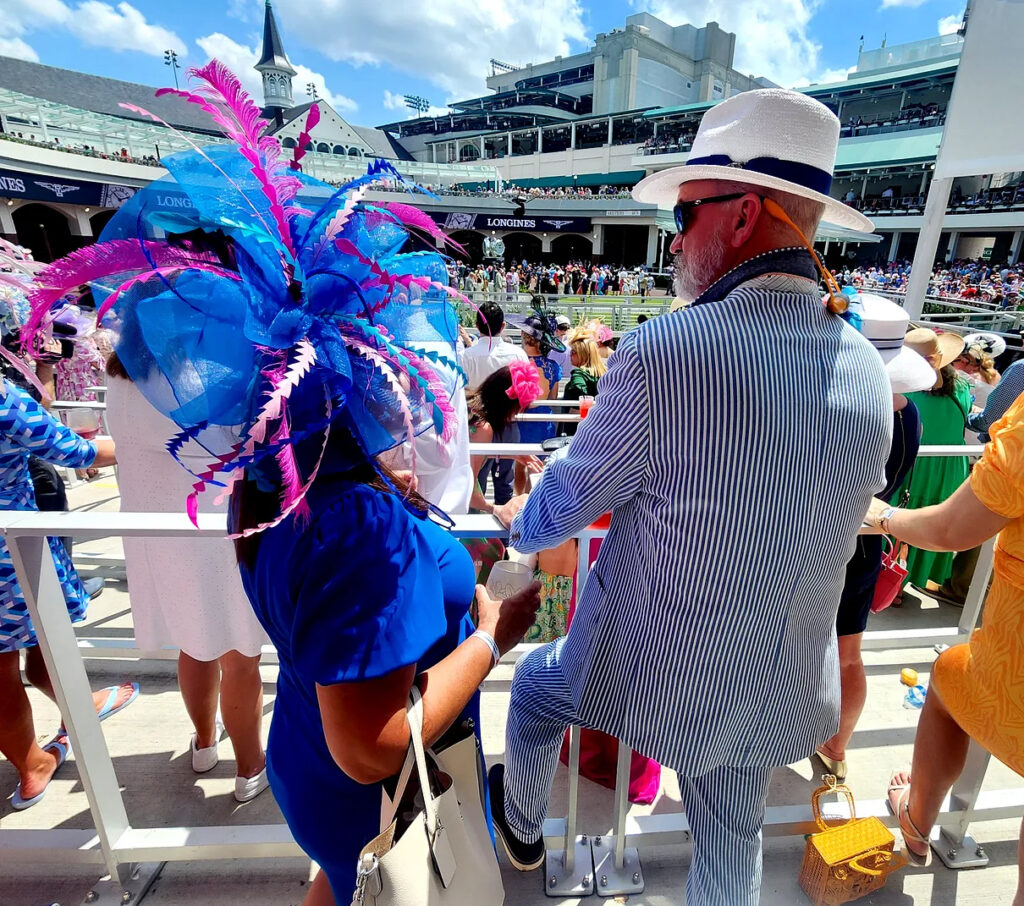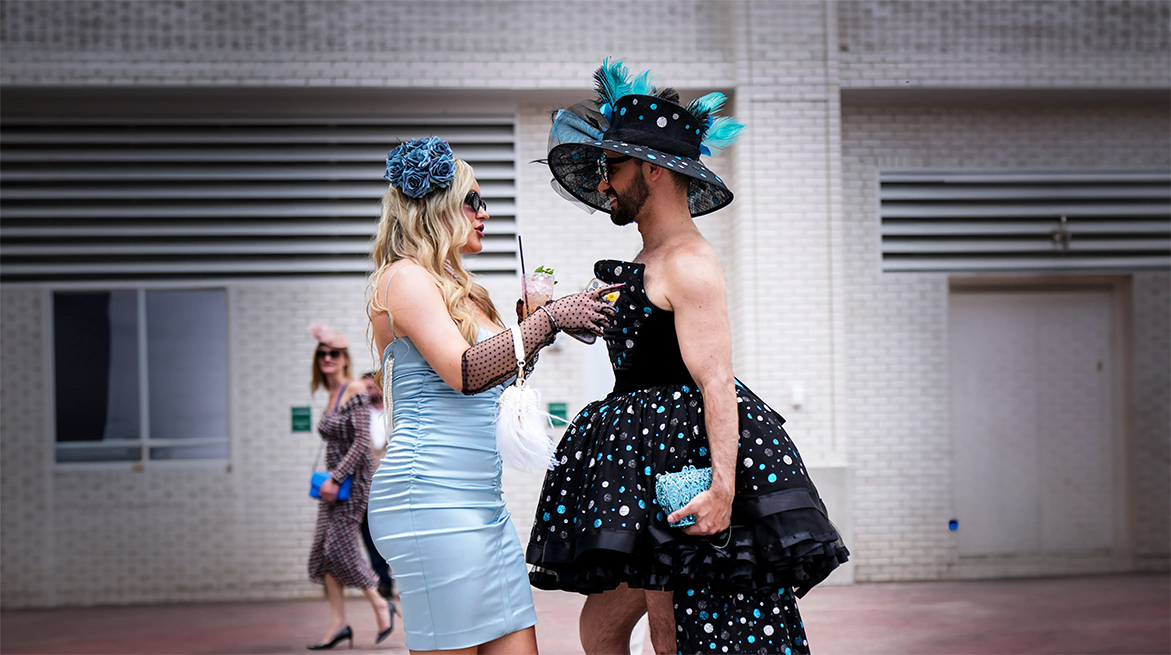How I felt as the only man in a dress at the Kentucky Derby
Our privilege in San Francisco extends beyond food, parties or iconic architecture: We live in the most saturated progressive community in the United States, which affords us radical inclusivity and self-expression. I’ve become so enmeshed in this bubble that I now fear emerging after 14 years, having seldom ventured outside California since moving to San Francisco in 2010.
I realize how extra that sounds, but it’s hard to illustrate how much our country feels infused with homophobia. As Panti Bliss deftly put it in 2014, “I am 45 years old and I have never once casually, comfortably, carelessly held hands with a partner in public,” she said. “Gay people do not get to hold hands in public without first considering the risk.”
We also weigh what we wear and how we talk, and many men in my romantic life have asked me to tone it down whenever we’re outside Castro neighborhood and around straight people. Much division remains between heterosexual and LGBTQ+ communities despite progress made toward equality the past decade — because drag bans, conversion therapy, and trans discrimination are still very present parts of today’s dialogue.


So when I told friends my plans to go to the Kentucky Derby this season, most could not wrap their minds around why I would enter a state that voted for Donald Trump in 2016 and 2020, and still has a sodomy law on its books. I was also scared, so I brought pepper spray with me and tested a way to pee in my gala gown without using a bathroom.
Most of my concern was unwarranted — it turns out — and I had a fantastic time.
This was my Burning Man, Coachella, or Met Gala. I now understand why people spend thousands annually on artistic events that feed their soul — Kentucky Derby not only fed me, it ate. The fashion was hands-down unmatched in any event I have ever seen, ranging from elegant to extra, campy and jaw-dropping.




Yes we also received looks of disgust and confusion, but no homophobic words shouted or threats of violence, not at the Derby nor any other time during my weeklong stay in Louisville. In fact I can’t remember another event as well organized or civil, from a seamless shuttle service to the event, no line at the entrance, and no one pushing me or asking that I move so they can go meet their friend, go to the bar, to a stage or to the bathroom. I am used to the Outside Lands order of things where this happens pretty much every five minutes.
Most people celebrated my gown, and much like at San Francisco parties, they asked about my inspiration or told me they had a fashion-forward or queer child who would feel inspired if they could please pass along a photo of me. My favorite interactions came from a gay man who walked past and said simply, “Thank you for representing the family.” And from a woman just outside Churchill Downs who wanted to understand why I donned a gown without doing full drag in makeup, a wig, and sans scruff. Many people commented on my hairy legs.




I also discovered a vibrant and tolerant Louisville outside the main event, from LGBTQ+ bars on Bardstown Road to an inclusive brewery, and rainbow murals and flags displayed in some of the city’s most prominent and historic neighborhoods.
The only real sour note actually came from another gay man who clearly had one too many White Claws. When I told him I didn’t care for Looking — the HBO series on queer life in the Bay Area — he said, “That’s exactly the sort of snobby thing I’d expect to hear from someone in San Francisco,” and stalked off.




The Derby still had problems but mostly with classism. They created a tiered system in the pandemic to cut down on crowds and to eliminate exchanging cash, so an entry-level $700 bought two days that included food and alcohol. But it also siphoned off inexpensive ticket-goers from the rest of the glitterati, confining them to a gated area in the mud with lawn chairs. In the grandstand bleachers, we saw a woman in full Karen mode yelling at others that her son works security and to get out of this exclusive area.




This was a star-studded event that attracted Martha Stewart, Jimmy Fallon, Kim Kardashian, Sara Hyland and Beyoncé’s mother, Tina Knowles — to name a few. In a city that probably has the world’s eyes on it only once a year, the goal feels very aimed at replicating a Hollywood red carpet experience.
We attended a Derby gala unlike anything I see in San Francisco, with an actual red carpet for a couple notable celebrities, working actors, pageant queens and honestly? Some has-beens and “who in the world was that” types, too. Highlights for me included meeting a very glamorous Gina Torres from Suits, Westworld, and Alias.
In San Francisco, red carpets are blue, pink, and canary, and we mob them with selfies and try to catch the attention of Drew Altizer’s camera; At Unbridled Eve, a red rope separates the wealthy from the untouchably rich, and the media? We ate under fluorescent lights in a cafeteria-style buffet that continuously ran out of utensils.




I was never mad though — What got me in the end was the kindness from everyone I met. The Derby is for Kentucky what Pride and Folsom festivals are for San Francisco; Most people we met were tourists, and everyone came to celebrate the fashion, the horse races, and the historic tradition of this event.
But on the topic of tolerance, do I feel forever changed by the kindness of Kentucky? No. We face many milestones ahead before there’s acceptance for all. But I would come back to the Derby again and again — and currently plan to for the foreseeable future.
This story originally appeared in The Bold Italic here.

Leave a Reply